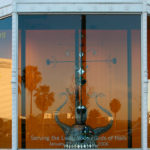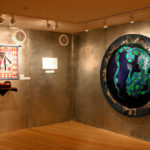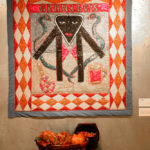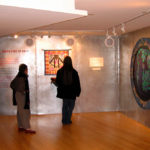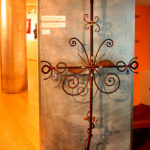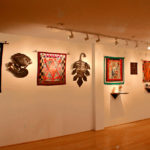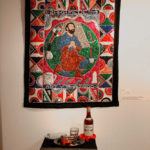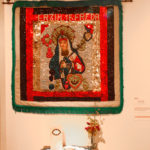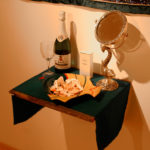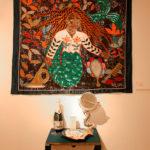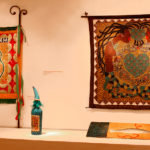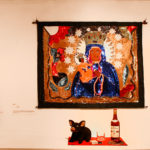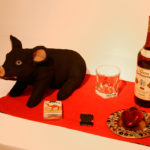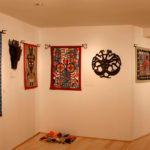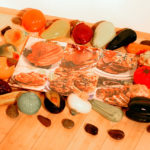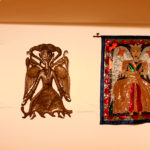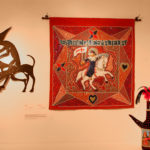Serving the Lwas: Vodou Gods of Haiti, an exhibition of contemporary Vodou flags and metal sculptures honoring the deities of Vodou, was curated by Haitian native, collector, and art dealer Carine Fabius.
In spite of its troubles, Haiti (which has been called a nation of painters) continues to astound the world with its unequaled production of art. Vodou (or Voodoo), a fascinating blend of powerful African tradition and French Catholic influence, infuses every aspect of Haitian life, most especially its art.
“Serving the Lwas: Vodou Gods of Haiti” focuses on the deities or lwas of Vodou in the form of Vodou flags or drapos — beaded and sequined wall-hangings traditionally used in ceremonies. The dazzling and intricate designs featured on the flags are physical representations of the lwas or of their symbols called vévés. Traditional offerings to some of the major lwas in the Vodou pantheon are presented as part of the exhibit. Additionally, the exhibition features unique metal sculptures inspired by the lwas from a variety of Haitian artists, as well as work on canvas and photography.
Carine Fabius:
Owner of Galerie Lakaye in Los Angeles, has devoted her career to promoting and preserving the richness of Haitian culture. “Most people have an image of Haiti that never includes the optimistic and hopeful spirit of the people, which manifests itself in the unlikely form of art. Haiti is a charming and mysterious place. Its cultural significance, and Vodou, its oft-misunderstood Afro-Caribbean religion, deserve closer inspection, and we’re happy to provide that opportunity with this exhibit,” shares Fabius.
This exhibition was partially funded by the City of Los Angeles Department of Cultural Affairs.
About CAFAM
The Craft and Folk Art Museum (CAFAM) is a Los Angeles nonprofit cultural arts organization dedicated to the public presentation and preservation of folk arts and contemporary craft. Founded in 1965, originally as “The Egg and The Eye” by the late Edith Wyle, who passionately promoted traditional artisans and the virtue of handmade art, the Museum opened in 1974. As a local Museum with global reach, CAFAM seeks to promote international goodwill and global understanding among its citizens. The Museum works to preserve and strengthen the folk culture of our community based on its believe that the quality of urban life is directly related to the vitality and diversity of viewpoints and traditions. |
